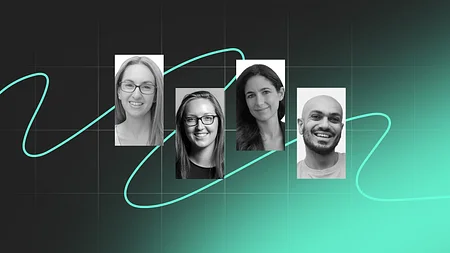Reimagining Processes and Culture in Business
Sarah Kocianski should be familiar to all of you now, she has hosted our three podcasts: Fintech Insider, Blockchain Insider, and Insurtech Insider, as well as penned many of our blog posts and reactions to major news in the fintech space.
I had a chance to sit down with Sarah and talk to her about what makes her most passionate about fintech and what she believes needs to happen most in business.
For someone with such passionate rants about fintech (listen to the podcast!) it’s hard to believe that Sarah fell into the fintech world almost accidentally. She started at Monetise, one of the earliest fintechs, as an Administrative Assistant years ago after a false start in publishing.
From there her employers soon realised that Sarah is an asset to the fintech world and she was providing market insight and analysis in no time. In her next move Sarah went to Business Insider where she ran their fintech vertical. Now she’s happily at 11:FS, working on 11:FS Pulse and hosting our podcasts.
During her six years in the fintech space Sarah has observed a great deal about financial services. The thing that stands out the most is: across the sector processes have stayed the same. Processes are stagnating, and there’s no reason why they should be. The digital environment available to incumbent banks is so flexible they should be using the available technology to eliminate now-redundant steps.
Banks need to use technology to upend the way products are created and the way customers are served. For this to happen it has to go hand in hand with a cultural change: you have to decide to do things differently.
Many fintechs give people a choice to use new features that aren’t completed and let customers know that it may be buggy or may be rolled back. Banks can do that too. That way the people who are testing it are those who are early adopters and won’t mind if things go a bit wrong. If all a bank is doing is testing a new feature on an app then they should be able to offer that to customers.
Fintechs grow fast so their processes are created ad-hoc, whereas banks are almost completely the opposite. Banks do what people have always done but faster with new technology. Changing culture means using technology to affect real change instead of just speeding up present processes. What banks need to do is learn to incorporate technology into creating their processes. That means processes are never fully set, they need to be constantly evolving with technology and theory. The change has to be on-going otherwise you just establish a new set of steps you refuse to change. However, to do things in a different order or with different steps requires you to accept that the outcome may not be exactly the same. This is where the idea of failing fast comes into play. Fintechs often roll out products that don’t work which they then have to roll back. However, instead of losing huge amounts it’s often not a big deal because they’re interacting with their users and they know quickly whether or not a product has viability. Any change has to make most of your customers happy. That can be discovered quickly, while production is still happening, if banks become flexible. If they don't then they're destined to just run in place while fintechs race ahead. To find more of Sarah’s insights into fintech, you can find her research reports on 11:FS Pulse and hear her regularly on the Fintech Insiders podcast. You can also read her articles on Forbes.
Change Tech Culture
Banks need to use technology to upend the way products are created and the way customers are served. For this to happen it has to go hand in hand with a cultural change: you have to decide to do things differently.
It’s not about letting people wear jeans or giving them a ping pong table to play - Sarah KocianskiRevolutionising processes using different sources of information and truly taking advantage of the APIs now provided through Open Banking. For example, Funding Circle provide one document online for customers to fill in with all the information they need, instead of separate documents for each bit of information. However, this can be explained in part by banks’ historical dislike of change. For the moment they’re content with clunky processes that they know work, instead of making changes to streamline and reduce wait times for customers. Incumbent banks have to start accepting and making changes. Their competitors are already charging ahead with their own arms race; developing faster account creation and smart banking features for customers. And incumbent banks are barely able to keep up.
Don’t Wait Until It’s Perfect
Many fintechs give people a choice to use new features that aren’t completed and let customers know that it may be buggy or may be rolled back. Banks can do that too. That way the people who are testing it are those who are early adopters and won’t mind if things go a bit wrong. If all a bank is doing is testing a new feature on an app then they should be able to offer that to customers.
Agile isn’t a thing it’s a mindset - Sarah KocianskiWhat banks do historically is not release anything until it’s perfect, but then you get situations like Barclays releasing Bpay which came out after everyone had already adopted contactless. Barclays had invested 2 years into it already so they had to make their money back but no-one wanted to pay for it. Contactless was already available and essentially free. If Barclays had been more flexible they could have rolled out the product mid-production while it was still having issues. By being upfront with users about potential bugs and using customer feedback to generate a more workable product they may have recouped or prevented their losses. Large organisations simply need to learn to be more flexible in everything that they do, with compliance as an exception, although that’s true of fintech too. In regards to compliance, you have to adhere to regulations no matter who you are, but that doesn’t mean you can’t approach it in a new and flexible way.
Be Better Not Faster
Fintechs grow fast so their processes are created ad-hoc, whereas banks are almost completely the opposite. Banks do what people have always done but faster with new technology. Changing culture means using technology to affect real change instead of just speeding up present processes. What banks need to do is learn to incorporate technology into creating their processes. That means processes are never fully set, they need to be constantly evolving with technology and theory. The change has to be on-going otherwise you just establish a new set of steps you refuse to change. However, to do things in a different order or with different steps requires you to accept that the outcome may not be exactly the same. This is where the idea of failing fast comes into play. Fintechs often roll out products that don’t work which they then have to roll back. However, instead of losing huge amounts it’s often not a big deal because they’re interacting with their users and they know quickly whether or not a product has viability. Any change has to make most of your customers happy. That can be discovered quickly, while production is still happening, if banks become flexible. If they don't then they're destined to just run in place while fintechs race ahead. To find more of Sarah’s insights into fintech, you can find her research reports on 11:FS Pulse and hear her regularly on the Fintech Insiders podcast. You can also read her articles on Forbes.


